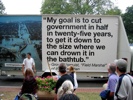« September 18, 2005 - September 24, 2005 | Main | October 02, 2005 - October 08, 2005 »
Breyer's Active Liberty
 NPR today features an interview w/Supreme Court Justice Stephen Breyer about his new book, Active Liberty : Interpreting Our Democratic Constitution. The bits played on Morning Edition suggest that, although conservatives have been the ones to most vehemently denounce “judicial activism” and the evils of “legislating from the bench,” the conservative justices (primarily Thomas) have been the ones most likely to invalidate laws passed by Congress, while Breyer is the justice least likely to do so. (ACS Blog has the details of that study.) So I guess those who condemn judicial activists are really condemning Scalia and Thomas, huh? Yeah, right.
NPR today features an interview w/Supreme Court Justice Stephen Breyer about his new book, Active Liberty : Interpreting Our Democratic Constitution. The bits played on Morning Edition suggest that, although conservatives have been the ones to most vehemently denounce “judicial activism” and the evils of “legislating from the bench,” the conservative justices (primarily Thomas) have been the ones most likely to invalidate laws passed by Congress, while Breyer is the justice least likely to do so. (ACS Blog has the details of that study.) So I guess those who condemn judicial activists are really condemning Scalia and Thomas, huh? Yeah, right.
The full, hour-long interview w/Breyer is available for streaming, but the following are some highlights from my listen:
Breyer defines “active liberty” as a distinction between freedom guaranteed by law from the government (freedom of speech is freedom from gov't action to restrict speech), and another, more ancient concept, that citizens of a community will share legitimate authority in that community. He traces this latter idea back to the Greeks. The notion today is that each individual shares the power of authority—it's called democracy. He wants to stress “active liberty” because that democracy only works if the average citizen participates.
The judiciary's role is to recognize the importance of active liberty and to understand that the Constitution wants to create a set of institutions to enable people to decide things democratically. When deciding conflicts between majority and minority interests he says we should return to fundamental principles of democracy. So in the Michigan affirmative action case, Breyer argues that all the amici briefs from the business community, the military, educational institutions, etc., showed that the people wanted the diversity that affirmative action provides, so upholding the constitution was consistent with democratic principles. In other words, he's a big believer in majoritarian rule.
On campaign finance laws, he argues that there are speech interests on both sides of spending restrictions, but the laws have the objective of leveling the playing field to make more equal exchange possible. The first amendment exists in order to allow people to elect the kind of government they want, and certain forms of regulation are necessary to promote that kind of conversation.
Speaking of campaign finance laws, I recently and somewhat foolishly entered the debate on this issue over at Althouse and basically got schooled by Stealth Law Prof who, like Althouse, disagrees w/Breyer on this point. I still maintain that conflating dollars and political contributions with speech is dangerous and antithetical to the democratic process b/c it inherently privileges those w/the most money and we should do what we can to prevent that. But I'm not prepared to defend that position against conlaw profs so I'll have to leave it there.
Anyhoo, the Breyer interview is interesting, but disappointing b/c his explanation of his philosophy does not seem as rigorous or clear as I was hoping. Perhaps the book makes it more clear, or perhaps he is really just as deluded about what he's doing as Scalia is w/the difference being that I tend to agree more w/the outcomes of his delusions than I do w/the outcomes of Scalia's delusions.
That said, how cool is it that we can all listen to this complete interview whenever we want? Before the internet, all we could have had was the 5-minute radio version and we would have had to listen when the radio station chose to broadcast it. Now, we can listen to that 5-minute bit whenever we want, and we can listen to the full interview whenever we want, and that is just very cool.
Posted 10:13 AM | Comments (2) | TrackBack | law general
Getting Green
 The polar ice caps are melting, and that only speeds global warming. We're running out of oil and even Yubbledew is asking people to conserve. (I'm still in shock about that one.) We've got problems, people.
The polar ice caps are melting, and that only speeds global warming. We're running out of oil and even Yubbledew is asking people to conserve. (I'm still in shock about that one.) We've got problems, people.
That's why one of the highlights for me at the D.C. Green Festival on Sunday was listening to Lester Brown, director of the Earth Policy Institute, and author of Plan B: Rescuing a Planet under Stress and a Civilization in Trouble. The following are just some notes I jotted down while listening to him speak.
First, the Earth Policy Institute recently learned that for the first time China is now consuming more than the U.S. in four of five basic resources—grain, meat, coal, and steel. The only thing the U.S. still leads in is oil. (Surprise.) That's total consumption. If China catches up to us in per capita terms, which it will do by 2031 at its current rate of growth, China will need: 2/3 of the current global grain harvest, 300 million tons of paper/year (world output today is only 156 million tons/year), and 99 million barrels of oil/day (total world output today is only 81 million barrels/day). If Chinese citizens owned cars at the rate Americans own them, China would have a fleet of 1.1 billion cars; the current world car fleet is only 800 million cars.
 The point of this is that the western economic model will not work for China. It won't work for India, which will have more people than China by 2031. It won't work for most of the world, and it can no longer work for us. We're running out of resources and the results are going to be catostrophic if we don't do something. (Speaking to this point, Brown also recommends Collapse: How Societies Choose to Fail or Succeed by Jared Diamond.
The point of this is that the western economic model will not work for China. It won't work for India, which will have more people than China by 2031. It won't work for most of the world, and it can no longer work for us. We're running out of resources and the results are going to be catostrophic if we don't do something. (Speaking to this point, Brown also recommends Collapse: How Societies Choose to Fail or Succeed by Jared Diamond.
So what do we do? Plan B.
If everyone who owns a car in the U.S. owned a Prius we would cut daily fuel consumption by half. If we added a second battery to those Priuses and added a charging plug so we could plug them in at night (so they could run longer on electric only w/out the gas engine kicking in), the vast majority of daily driving in the U.S. could be powered by electricity alone. And if we invested massively in wind power, all of that electricity would be generated w/out polluting the environment or using up some non-renewable resource.
Biodiesel figures in somehow—comes from soybeans. Ethanol from sugar cane could also replace lots of our oil consumption. Brazil currently gets 40% of its automotive fuel from cane ethanol and it may soon get much more.
By 2020, 50-100% of European households could get their electricity from wind power, depending on how quickly Europe continues to invest in this resource. Just three states (North Dakota, Texas, and third I missed) have enough wind and land to build wind farms available to provide all U.S. energy needs via wind power. We just have to build the wind farms! (No need for the “nukuler” energy Bush wants to invest in.)
Brown said he's not discouraged about the future because often social change comes very quickly and we can't anticipate it. For example, look at what happened in Eastern Europe in the late 1980s. One day it was the communist bloc, the next it was a bunch of democracies. Or look at December 6, 1941. If you had polled Americans on December 5, 1941 about whether the U.S. should get involved in WWII, the answer would have been a resounding “No.” But after December 6, that turned around completely. We also followed that by restructuring the economy almost overnight to produce all the ships, tanks, aircraft, guns, and ammo required for the war. How did we do that? We made the sale of private automobiles illegal and converted auto factories into munitions factories. So we've revolutionized our economy before on short notice; we can and need to do it again.
One way to make this happen is to force the market to be honest about the cost of our actions. For example, the cost to society of smoking is about $7/pack. The production cost of cigarettes is about $2/pack. So the total cost of a pack of cigarettes really should be $9/pack. In another example, the cost to society of burning a gallon of gas is about $9, so added to the current price at the pump, a gallon of gas should cost about $12/gal.
To convert our economy and our lifestyles to sustainable methods would cost money. But put it in perspective. The U.S. budget for Iraq is $400-500 billion and climbing. That's roughly equal to the total annual spending of the rest of the world combined. To do everything called for in Plan B would cost about $150 billion worldwide of additional spending.
And we need to do this. Terrorism is a threat to our future, but not as big a threat as climate change, population growth, water scarcity, or the lack of planning to deal with these issues. The key solution is grassroots political action. Saving civilization is not a spectator sport; we all have to be involved.
Posted 10:41 AM | TrackBack | ai books general politics
Locked Up to Die in Templeman III
Since hurricane Katrina hit we've all heard many stories of poor planning, and poor-to-horrible choices made by people who were in various positions of responsibility in terms of helping to reduce the human cost of the storm. But among those stories, yesterday was the first I'd heard of the Orleans Parish jail where guards and officials just left the prisoners locked up to die when the floodwaters started rising. L. pointed me to yesterday's Democracy Now which has many of the details about the facility known as Templeman III.
Thumbnail sketch: The storm started and no one did anything about evacuating the jail; instead, many area jails transferred prisoners there so the place was totally overcrowded w/people just wandering in common areas, etc. Water started rising, the guards abandoned the jail. Eventually some of the prisoners who were sort of “free” in the common areas helped others break out of lower cells so they wouldn't drown. And when prisoners eventually got out of the jail, the guards were waiting outside to transport them to an overpass where they were made to sit, some for three days or more. They were not allowed to move and had to relieve themselves where they sat. They were also not given food or water. When they were eventually bused out, they were scattered all over the place to approximately 39 facilities. This has made tracking them down and helping them get out of jail a nightmare. Many of them were moved to a prison football field somewhere where death-row prisoners were mingling freely w/misdemeanor defendants who hadn't even had a trial yet and had just been picked up for reading taro cards w/out a permit. Guards would come to the football field once a day and throw peanut butter sandwiches over the fence.
Currently over 500 prisoners from Templeman III are still unaccounted for, though it seems unlikely that that many died. Thank goodness for criminal defense attorneys Phyllis Mann, Ben Cohen, and Marcia Widder, who have been investigating all of this and have filed writs of habeas to get as many of these people released as possible.
Imagine: You're picked up for something ridiculous like reading taro cards, you face a max of 1-3 days in jail maybe—if you're even convicted—and you end up being in jail for weeks and going through all of the above horror. Many of these people were just being held pending trial!
How the heck could this happen? What were those guards thinking when they just left the jail w/thousands of prisoners locked inside as the water began to rise?
Women, Listen to Your Mothers
 We saw the White Stripes last night at the Merriweather Post Pavilion. Cool venue, great show. Look, that's them in the pic at the right. Really. Ok, no need to enlarge that photo; you'll just have to trust me that we were there. Hey, and check it out, you can be there, too! NPR recorded the show and it's now available for your listening pleasure! Or if you subscribe to NPR's All Songs Considered podcast, I believe today's download will be this show.
We saw the White Stripes last night at the Merriweather Post Pavilion. Cool venue, great show. Look, that's them in the pic at the right. Really. Ok, no need to enlarge that photo; you'll just have to trust me that we were there. Hey, and check it out, you can be there, too! NPR recorded the show and it's now available for your listening pleasure! Or if you subscribe to NPR's All Songs Considered podcast, I believe today's download will be this show.
As you can tell from the recording, for two little people, Jack and Meg sure can make a lot of great noise! Before the show L wondered whether the Jack and Meg ('cause, you know, I'm on a first name basis w/both of them, now that I've seen them play live) were going to play everything themselves. I figured they'd be using taped loops or whatever to augment their own instruments; I was wrong. It was just the two of them the whole time, and that was awesome!
They also did a great job of adding variety to the set—keeping the big hits recognizable, yet jamming them out to keep reminding you that this is live. (I hate it when bands just play their songs exactly as they were recorded; that always gives me the feeling I might as well just be listening to the CD at home.) The two of them are also relentless—they just kept playing and playing and playing at this frenetic pace (they played almost all the songs much faster than the recorded versions) w/out pause for water or even catching their breath. Pretty impressive, really.
Watching these two perform, I was thinking that maybe one of the reasons they're so popular (besides creating catchy rockin' tunes, of course) is that they sort of seem like humble, normal people. I don't know why this is; maybe it's just that they don't both look like supermodels or something, or maybe it's because I know Jack used to be a manual laborer (a furniture upholster) before he became a rock star. They're just cool people who like to rock out. At least that's the vibe they seem to project.
Anywho, good show. Worth a listen if you're even a sort of fan.
Althouse Express!
 Congratulations to Professor Althouse for being quoted on page 37 of Tuesday's Express newspaper. The paper is available here in PDF format (caution: huge file!), but the relevant portion is reproduced at right (click to enlarge). The paper quoted Althouse's comments on the risk that the flood of money into the hurricane-ravaged areas of the gulf coast will lead to a different form of looting as unscrupulous individuals and corporations vie to get their hands on those recovery dollars.
Congratulations to Professor Althouse for being quoted on page 37 of Tuesday's Express newspaper. The paper is available here in PDF format (caution: huge file!), but the relevant portion is reproduced at right (click to enlarge). The paper quoted Althouse's comments on the risk that the flood of money into the hurricane-ravaged areas of the gulf coast will lead to a different form of looting as unscrupulous individuals and corporations vie to get their hands on those recovery dollars.
Somehow Althouse seems to have become something like an A-list blogger—she's on lots of radar screens. Is this because she's a law prof and therefore has some kind of automatic credibility? Is it because she claims to be a middle-roader politically? Or is it simply the fact that she posts so frequently and on such a wide range of topics? The world will probably never know.
Oh, for those not familiar, the Express is a tabloid daily that's printed by the Washington Post and available for free throughout the city (but predominantly around metro stations so people can read it on their commute).
Posted 10:02 AM | TrackBack | meta-blogging
Blawg Review #25
 Welcome to Blawg Review #25, the Protest Edition! Since “the largest show of antiwar sentiment in the nation's capital since the conflict in Iraq began” was just last Saturday, I've been thinking a bit about “protest” as both a way of life and a mode of expression. I realized that, whether they're protesting for themselves or on behalf of others, lawyers are almost always protesting something—that's their job. Isn't every lawsuit a form of protest against something or someone? Today's Review will highlight a wide variety of such protests that appeared in the blawgosphere in the last week and will feature a selection of images from the Sept. 24th peace march in D.C. But before diving into all the protests I want to invite you to check out some great new blawgs—they're popping up all over the place! Give a hearty welcome and read to:
Welcome to Blawg Review #25, the Protest Edition! Since “the largest show of antiwar sentiment in the nation's capital since the conflict in Iraq began” was just last Saturday, I've been thinking a bit about “protest” as both a way of life and a mode of expression. I realized that, whether they're protesting for themselves or on behalf of others, lawyers are almost always protesting something—that's their job. Isn't every lawsuit a form of protest against something or someone? Today's Review will highlight a wide variety of such protests that appeared in the blawgosphere in the last week and will feature a selection of images from the Sept. 24th peace march in D.C. But before diving into all the protests I want to invite you to check out some great new blawgs—they're popping up all over the place! Give a hearty welcome and read to:
- bk!: The blog of Brandy Karl, f.k.a. “alice” of A Mad Tea-Party. Thanks to Bag and Baggage for the tip! I'm sure anyone who used to read and enjoy the Tea-Party on a regular basis will agree that it's great to see Brandy/Alice blogging again. Unfortunately, just as we discover Brandy's new identity and home—as well as the fact that she's a happy lawyer!—we must also extend our sympathies as she copes with a death in the family.
- Blackprof.com, a new blawg by nine prominent black law professors. I've had the good fortune to be able to work with Professors Spencer Overton and Paul Butler in setting up and designing this new blawg and it's been great to see it take off and start generating hits and great discussions. Check it out for lots of insight into critical right-to-vote issues, law school diversity, the difficulty Americans seem to have in talking about the racial implications of hurricane Katrina, and much more.
- The Clerkship Notification Blog, a group site whose goal is to distribute information about the clerkship notification processs. This will only be a useful resource if lots of law students participate so the blawg's author has asked for help to get the word out about the site. And if you're a law student who has applied for a clerkship, be sure to visit and leave any information you know.
- Law Spouses, a new “blog community for those who love a law student.” This blog's author aims to create a resources for spouses, boyfriends, girlfriends, friends, etc., of law students to help them deal w/the challenges that arise when their loved ones give their lives to law school. If you're a spouse or partner or other loved one of a law student and you'd like to become a contributor at Law Spouses, get thee to the comments and let the author know!
 Protest This!
Protest This!
Starting us off, Timothy Sandefur at Positive Liberty is protesting the hypocrisy of U.S. drug laws via this Slate article discussing William Rehnquist's alleged addiction to sedatives. Sandefur writes:
“The point here is that our government looks the other way, and gives light slaps on the wrist, to people in positions of power and notoriety for the sort of drug 'crimes' that ought not to be crimes to begin with, and that bring substantial punishments when committed by the underclass. That is the sort of hypocrisy that really does do damage to a society's moral standing, and serious damage. To Rehnquist's credit, however, he did not partake of that hypocrisy in the Raich case, where he had the courage to join the dissenters. I'm not a big Rehnquist fan, but he deserves props for that one.”
Speaking of white collar crime (and can you get much more white collar than the Chief Justice?), last week Professor Bainbridge invited protests both for and against white-collar crime sentencing policy when he asked, “As a matter of sound sentencing policy, should first offender white collar criminals serve their sentences in a maximum security prison?” The question prompted a lively discussion, both on the professor's blawg and on Crime and Federalism, where Mike asked, “Why are white collar sentences so long?” He says it's because otherwise these crooks would go unpunished:
If there weren't harsh sentences, white collar defendants would go to trial, since they'd have nothing to lose. And since they can afford top-flight counsel, they'd often win. It is unacceptable for white collar defendants to escape the trial tax. Sentences like those in the Kozlowski case will remind defendants to think twice before going to trial.
The Stopped Clock riffs on a similar theme, protesting that problems in criminal justice go unresolved because we figure criminal defendants are “probably guilty of something anyway.” And we call this justice?
Our discussion of white collar crime would hardly be complete without input from the White Collar Crime Prof Blog, so check out that blog's analysis of the “CSI effect” on white collar prosecutions.
Moving from theory about white collar crime to its real practice in the wild, Professor Bainbridge also notes that Bill Frist is being accused of insider trading (followup here). And in the news we see that the Jack Abramoff lobbying scandal is has reached the White House. Lock up the crooks!
 Over at Wordlab, Abnu protests that a couple of lawyers have filed a trademark application for the word “Katrina”:
Over at Wordlab, Abnu protests that a couple of lawyers have filed a trademark application for the word “Katrina”:
With dead bodies still floating in the streets of New Orleans, a pair of Louisiana lawyers are seeking to cash in on the killer hurricane by slapping the name Katrina on alcoholic beverages. In a new filing with the U.S. Patent and Trademark Office, Andrew Vicknair and Harold Ehrenberg provided federal officials with a logo--reproduced above--bearing the word Katrina, the phrase “Get Blown Away,” and a small satellite image of the deadly storm.
 PHOSITA also reports on other Katrina-related trademark applications and provides the first connection I've seen between that storm and a certain 1980s pop-band.
PHOSITA also reports on other Katrina-related trademark applications and provides the first connection I've seen between that storm and a certain 1980s pop-band.
In other Katrina-related news, J. Craig Williams of May it Please the Court® fame wonders whether insurers are going to get a pass on paying storm-related claims. The answer is all tort-o-rific and depends on proximate, concurrent, and principal cause. But hey, if you don't want to read about it, you can just sit back and listen because Williams kindly records most of his posts as podcasts. Where does he find the time?
Colin Samuels at Infamy or Praise protests a law suit by the Mississippi attorney general against five insurers “to force those insurers to pay flood damages suffered by their Mississippi policy holders despite clear exclusions in those policies and the ready availability of flood coverage from federal programs.” Samuels calls this a brazen and irrational encroachment on freedom of contract. And he's not alone; as Jonathan B. Wilson notes, Walter Olson doesn't like this lawsuit either. Be sure to read Wilson's post to see “what really chaps Olson's briefcase.”
Katrina has also prompted Evan Schaeffer and Dennis Kennedy to ponder how such a devastating storm might affect e-discovery. Schaeffer also notes that trial lawyers cause hurricanes. Gee whiz; all this time I thought money was the root of all evil...
 But Katrina played second fiddle last week to its little sister, Rita. Before Rita hit, Ernie the Attorney—who lived through Katrina in New Orleans—offered tips for evacuees. One recommendation was to have plenty of “calming agents like wine” on hand; better yet, you could just evacuate to a vineyard. Tom Kirkendall at Houston's Clear Thinkers expected that the economic effects of Rita would be huge. However, when the storm wasn't as devastating as predicted, he revised those expectations. Check out the posts in between for more on the storm, including some interesting thoughts on the chaotic evacuation of Houston. Beldar Blog also updated frequently on Rita's progress, including great posts on the evacuation gridlock, a nearly hour-by-hour update of living through the storm, and observations on the aftermath.
But Katrina played second fiddle last week to its little sister, Rita. Before Rita hit, Ernie the Attorney—who lived through Katrina in New Orleans—offered tips for evacuees. One recommendation was to have plenty of “calming agents like wine” on hand; better yet, you could just evacuate to a vineyard. Tom Kirkendall at Houston's Clear Thinkers expected that the economic effects of Rita would be huge. However, when the storm wasn't as devastating as predicted, he revised those expectations. Check out the posts in between for more on the storm, including some interesting thoughts on the chaotic evacuation of Houston. Beldar Blog also updated frequently on Rita's progress, including great posts on the evacuation gridlock, a nearly hour-by-hour update of living through the storm, and observations on the aftermath.
Back to political protests, the gentlemen at the Power Line blog are protesting the fact that Yubbledew President Bush recently appointed someone who was foolish enough to admit she doesn't know everything to a position in the DHS. The post wins this week's award for best title with: “Stuck on Stupid, and Not Too Brite.” Are they talking about their president, or....?
Continuing the “stuck on stupid” theme, Retired Army JAG Officer suggests that Democrats are exactly that. Al Nye The Lawyer Guy doesn't use the exact phrase, but it seems applicable to some of these crazy quotes from consumers and creditors.
But not everyone was stuck on stupid last week.  Professor Tung Yin used the mid-season cliffhanger of Battlestar Gallactica (BSG to those of us who are addicted to this, the best show on tv possibly evar!) to protest torture as a tool of interrogation.
Professor Tung Yin used the mid-season cliffhanger of Battlestar Gallactica (BSG to those of us who are addicted to this, the best show on tv possibly evar!) to protest torture as a tool of interrogation.
Norm Pattis at Crime and Federalism protested some of the stupid questions senators asked John Roberts last week.
Monica Bay at The Common Scold managed to get quoted and pictured in the NY Times for her protest against spotty cell phone reception in rural areas.
Professor Althouse protested the cancellation of The Comeback, the Lisa Kudrow show on HBO. The good professor has also begun podcasting, joining Professor Gordon Smith of the Office Hour Podcast on the Wisconsin Law Prof podcast team. Come on you other law profs, it's time to step up to the mic!
At Between Lawyers, Dennis Kennedy responds to a critique of the “non-commercial use only” Creative Commons licenses. Kennedy asks: “What do you really intend 'non-commercial use' to mean?” Personally I intend it to mean something like “quit being a greedy capitalist pig!” but I welcome Kennedy's call for the Creative Commons to “take a stronger leadership role in providing interpretations of the license provisions.”
 Reporting Protests
Reporting Protests
When lawyers aren't protesting anything themselves, they frequently excel at reporting on and analyzing the protests of others. For example, Andrew Raff is in this reporting mode at the IPTAblog where he presents an exhaustive roundup of the Author's Guild's lawsuit to prohibit Google from scanning copyrighted books without obtaining permissions from the copyright owners. The gist seems to be that a majority of commentators think Google's “fair use” claim will win the day, but read the full post for much more.
Also in the reporting mode, Paul L. Caron at Tax Prawf Blog notes that Harvard has changed course and is allowing military recruiters on campus in order to make sure the school maintains access to federal funds. However, Harvard is continuing its protest in a different form:
Todd Zywicki comments on this at the Volokh Conspiracy, as well. Hey, maybe if Congress didn't support sending U.S. troops to die in unjustified wars of aggression it wouldn't see so much opposition to the military's recruitment efforts. Of course, there's also that completely discriminatory and irrational “don't ask, don't tell” policy the military maintains, so there's quite a bit for Harvard and other schools to protest, actually.University President Lawrence H. Summers said in a statement tonight that Harvard will file a friend-of-the-court brief tomorrow urging the Supreme Court to invalidate the Solomon Amendment, the statute passed by Congress in 1994 that allows the secretary of defense to block federal funds to universities that deny military recruiters “equal access” to campuses.
But speaking of the Volokh Conspiracy, Orin Kerr reports that the new war on porn is “a running joke” at the FBI. Protest at the FBI by agents? That's a good one.
They already gave at home, indeed.“I guess this means we've won the war on terror,” said one exasperated FBI agent, speaking on the condition of anonymity because poking fun at headquarters is not regarded as career-enhancing.
Robert Ambrogi reports on the boatloads of cash NY lawyers take home, and since he's not really protesting, let me fill that gap: Judge Judy makes $30 million/year!? She's awful! Am I the only one that finds that not only shockingly ridiculous, but morally offensive, as well? Oh, and while we're at it, why do public defenders make less than prosecutors?
From money to sports (a pretty natural jump, don't you think?) Mark at the SportsBiz blog reports that several college football players have sued the NCAA “alleging that the NCAA's scholarship limitations are an illegal restraint of trade adopted in the name of cost containment by an organization that illegally monopolizes 'big time' college football.”
And in one other sports-related post, Richard Radcliffe of the Law Religion Culture Review notes that O.J. Simpson continues to have a talent for generating lawsuits. It's good to be good at something, you know?
 Implicit Protests
Implicit Protests
Lots of blawg posts fall into the category of implicit protests against something or other (or, perhaps I should say that a determined blawg reviewer can force them inside that box). David Swanner of the South Carolina Trial Law Blog files such an implicit protest against poor law office management with his keys to a smoothly running law office. It's all about having a plan for cases, finances, marketing, business, and life. So what's your plan, man?
Jim Calloway's Law Practice Tips Blog joins Swanner by offering tips for using desktop search tools. Calloway also covers the interesting bits from the ABA's Legal Technology Survey. Only 19% of responding lawyers have used a wireless internet connection? If my own school is any indication, that number is going to skyrocket when the class of 2006 enters practice; just about every law student at GW uses wifi every day!
And speaking of law school, in an implicit protest against unhappiness in the legal profession, Jeremy Blachman recently called for feedback from law students about their perspectives on working in the legal profession. He writes:
I'm interested in what law students (or prospective law students) are afraid of, whether that relates to law school, or being a lawyer, or something else related. I'm interested in what law students wish was different about law school, or what lawyers wish was different about their jobs. I'm interested in what law students and lawyers would want to do with their lives if money was no object. I'm interested in parents and spouses of law students and whether they feel law school has changed their child, husband, or wife. I'm interested in what's wrong with the legal profession, and what's right with it. I'm interested in inspiration, and how that relates to any of this -- does what you're doing inspire you, or if it doesn't, what would need to change for it to do that.
Since he doesn't have comments on his blawg, Jeremy has been publishing some of the emails he's received. In chronological order, here's what he's got so far: post one, post two, post three, post four, post five, post six, post seven, post eight, post nine. There's a treasure trove of interesting perspectives there, so dig in.
One theme of those posts is the varying level of satisfaction with working as a legal professional, but there is more than one way to find happiness in the field. Just ask Dave Johnston, who left law school a few years ago and is now the chief blogger (or “Internet Content Manager”) at the Cato Institute in D.C. And if you decide you do want to be a lawyer rather than just working in a law-related position, yet you don't really dig law school, fear not! Who says a lawyer needs law school? Not me, that's fersure! As those of you who read the imbroglio regularly already know, getting rid of or generally improving law school is one of my favorite topics. Therefore, it was with relish that I noted several recent discussions about whether the third year of law school is really necessary, including this great summary post from Andrew Raff.
Oh, and if you're moving on from law school and looking for a job with a firm, rethink(ip) reminds you to be sure and ask your potential employer two important questions: “Who are your clients? Who are your best clients?”
- - - - -
Well, that's it for this little protest review. Blawg Review has information about next week's host, and instructions for getting your blawg posts included in upcoming issues.
From time to time, the Editor of Blawg Review also posts reviews of law blogs, sometimes republishing a review. Last week, there was a lengthy review of Crime & Federalism originally published by Mark Draughn. If you've seen a good review of a law blog, or would like to write one
for Blawg Review, please contact the Editor.
Posted 07:46 AM | Comments (3) | TrackBack | law general
One Great Weekend in DC
The weekend has been just about as busy and action-packed as the last post predicted. What an incredibly cool weekend to live in D.C.! My photos from yesterday's peace march are here. I'll have more about all of it in the coming days, but for now it's all about Blawg Review #25.
Posted 08:55 PM | TrackBack | life generally


